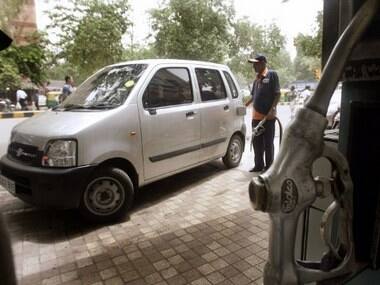Mumbai: Making a case for raising prices of diesel, kerosene and LPG, the Reserve Bank today said hike in rates of petroleum products is necessary to arrest fiscal slippages.
“Overall from the perspective of vulnerabilities emerging from the fiscal and current account deficits, it is imperative for macroeconomic stability that administered prices of
petroleum products are increased to reflect their true costs of production,” RBI Governor D Subbarao said in the Annual Monetary Policy Statement for 2012-13.
[caption id=“attachment_278652” align=“alignleft” width=“380” caption=“Making a case for raising prices of diesel, kerosene and LPG, the Reserve Bank today said hike in rates of petroleum products is necessary to arrest fiscal slippages. AFP”]
 [/caption]
[/caption]
While petrol prices are market-linked, the government fixes the rates of LPG, kerosene and diesel, which results in a large budgetary expenditure on subsidies.
Global crude oil prices have surged since the beginning of 2012 on account of geo-political concerns in the Middle East and abundant global liquidity. The price of Brent crude
rose to $120 a barrel in mid-April from $111 in January.
RBI said the Budget estimate of oil subsidy is likely to fall “significantly short of the required amount”.
High subsidies are putting pressure on the country’s fiscal deficit, which touched 5.9 percent of GDP last fiscal and is pegged at 5.1 percent in 2012-13. India imports about
80 percent of its crude oil requirement.
The government targets to bring down the subsidy bill to below 2 percent of GDP this fiscal and 1.75 percent in the subsequent years. Government has made a provision of Rs
40,000 crore towards fuel subsidy for 2012-13.
“…Several upside risks to the budgeted fiscal deficit remain. Containment of non-plan expenditure within budget estimates for 2012-13 is contingent upon the government’s
ability to adhere to its commitment of capping subsidies,” Subbarao said.
Subbarao said any slippage in fiscal deficit would have implications for inflation. “Upside risks to inflation persist. These considerations inherently limit the space for
further reduction in policy rates,” he said.
Persistent demand pressure emerging from inadequate steps to contain subsidies, as indicated in the recent Union Budget, will further reduce the space for rate cut, he added.
Fuelled by gold demand, crude oil prices and decelerating growth in emerging economies, India’s current account deficit (CAD), widened to 4 percent of GDP in April-December 2011, up from 3.3 percent a year ago.
CAD is the difference between inflow and outflow of foreign exchange into the country.
In its Macroeconomic and Monetary Developments in 2011-12 report, the RBI had yesterday said, “The policy design to achieve macro-objectives hinges on deregulation and the upward adjustment of oil prices by letting the demand effects work towards diminishing fiscal and external risks”.
PTI
)